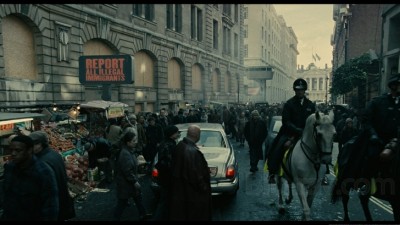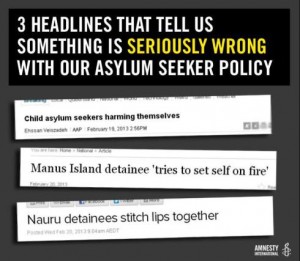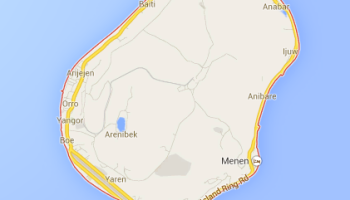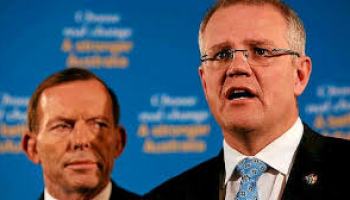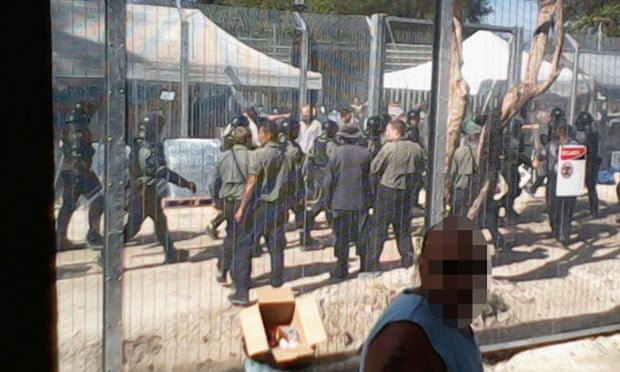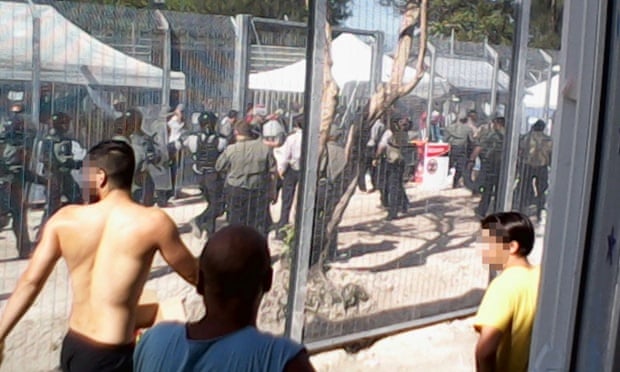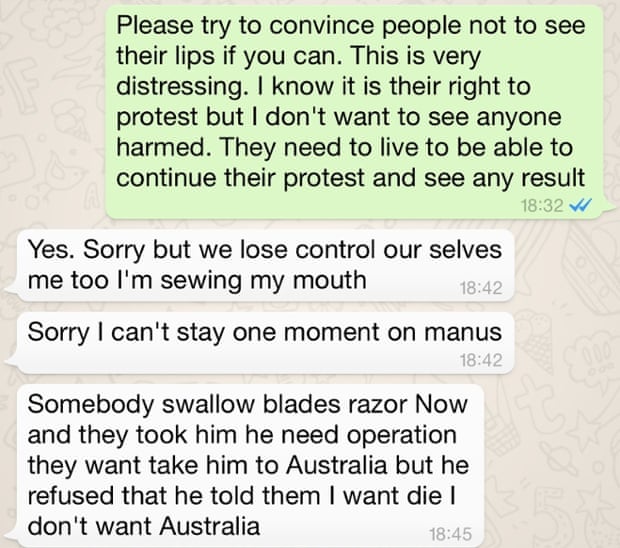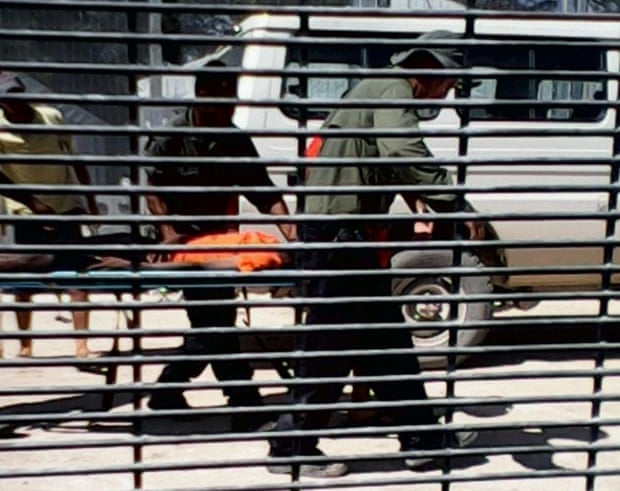Advance Australia unfair: Je suis les refugees du Manus

Australia's treatment of refugees on Manus Island has
disturbing similarities to the treatment of Jewish refugees fleeing Nazi
Germany before World War II says Lyn Bender, whose parents fled Poland
before the War.
As Tony Abbott praises the great work of guards in riot gear rushing in to control helpless refugees imprisoned in a compound, the suffering, attempted hangings, swallowing of razor blades, thirst and hunger continues at Manus. I ask myself: what have we all become?
My father was a refugee. So was my mother.
Is it this fact that prompts me to ask why are we not all horrified
at the cruelty and abuse of our refugee “policy”? How can a government
that thinks like a reincarnated Nazi machine, get away with such
brutality? How can they refuse to disclose the true story while
professing to champion free speech?
Drawing comparisons between Australia’s offshore detention centres and the Nazi concentration camps is usually slammed as over the top and as a travesty.
Yet Thomas Keneally, author of Schindlers Ark, in 2004 compared Australia’s detention centres to concentration camps.
They have not improved since.
How do we dare to compare our civilised government with that
atrocity? Easily. For starters, refugees have been imprisoned
indefinitely in sub-standard camps
and without trial, merely for seeking our help The plight of the
refugees on Manus is easily as horrendous as the plight of the Jews
trying to flee Nazi persecution in the nineteen thirties. My father was a
refugee and so was my mother and her family. I would not have been
born, had they not been allowed to live in Australia.
My parents did not arrive on small boats; but on ocean liners. To be
allowed to come to Australia, you needed sponsorship from an Australian
citizen. Sponsorship was hard to get. Many friends and family remained
behind in Poland. My paternal grandparents, aunts, uncles and their
children were slaughtered when the Nazis invaded Poland. With such a
family background, it is not surprising that I feel an emotional
connection to the plight of asylum seekers on Manus Island. But it took
me a while to recognise that the parallels were deeply connected.
Historian Professor Bernard Wasserstein has revealed
the commonality of the attitudes towards the plight of Jewish refugees
in World War II and towards today’s asylum seekers. He cites all too
familiar terminology in his scholarly work; Gertrude Tijn and the fate of the Dutch Jews.
They were called "queue jumpers" and "economic migrants" and some were sent back to Germany.
Others were granted temporary settlement, while some drowned during
desperate journeys on unseaworthy ships. Despite the awareness of the
danger that the refugees faced, strict quotas were applied. Britain
accepted only 65,000, Holland 30,000 and the United States 150,000.
Wasserstein attributes the reluctance to welcome refugees as due to
xenophobia, anti-Semitism and fear of refugees being an economic impost.
Sound familiar?
The Evian Conference was
convened by the U.S. in 1938 to discuss the issue of increasing numbers
of Jewish refugees fleeing Nazi persecution — the "refugee problem".
At that conference, Australian delegate Thomas White stated about this country:
"It will no doubt be appreciated also that as we have no real
racial problem, we are not desirous of importing one by encouraging any
scheme of large-scale foreign migration …"
All this has a familiar ring in today’s Australia.
Collective guilt at the fate of Europe’s Jews may have driven the establishment of the 1951 Refugee Convention.
This grants the right of those fearing persecution to seek asylum. They
have the right not to be returned to danger. The importance of this Convention to Australia’s treatment of refugees is at least threefold:
- Those fleeing danger have a legal right to seek asylum and this right should be honoured.
- Asylum seekers should not be punished for seeking asylum.
- They should not be returned to danger.
So how bad is life on Manus? At least as bad as the conditions that I observed while working at Woomera Detention Centre in 2002.
Hunger strikes, sewn lips, suicide attempts, the last resort of the
powerless, were and still are featured daily. In a twisted form of
remembrance, the compound names are even the same: Oscar, Foxtrot, Mike
and Delta. The compounds have names, but detainees are given numbers.
Children become extremely depressed. The remoteness is meant to
discourage media scrutiny and accountability, but the truth emerged at
Woomera — just as the truth about Manus is also emerging.
The Liberal Party is singing in unison the chorus of “no compassion
here”. For a Government that professes to champion free speech, that
right is not being granted to refugees.
A member of the recently disbanded Immigration Health Advisory Group, psychologist Amanda Gordon, contends that refugees are using their bodies to express protest.
She says:
“For some it is a break down of mental health; but for others it
is in fact a sign of resilience. The sewn lips illustrate that no one is
listening and that they have no voice.
"Do you lie there and do nothing or do you make a statement?....
Don’t just treat me as a voiceless person …. If I had murdered someone I
would have a right to a voice. The hunger strike is an expression of
utter hopelessness”
Yet Foreign Minister Julie Bishop – with customary sang froid – declares:
“It is a volatile situation because these people clearly don't
want to accept the safe haven that's being offered to them. However this
kind of behavior will not be rewarded with a visa to Australia.”
Safe haven! She has got to be in satire mode.
Peter Dutton has admonished
the desperate on Manus as though they were misbehaving children, saying
they will never be settled in Australia. Just as was done with
“resettlement” of Jewish refugees, Dutton will be scurrying off to
overburdened Cambodia to finalize an agreement to dump Australia’s
refugee problem on another poor country.
It seems, from footage, that the current protestors are calling for freedom.
There are reported fears of forced “resettlement” in a hostile PNG. After the murder of Reza Berarti, you could argue that they have a well-founded fear.
We are now the persecutors. Both side of politics have shamelessly played with the lives of traumatised men women and children.
The irony is that Australia has prospered and thrived with its influx
of pre and post war refugees. Without the enrichment brought by the
European, middle eastern and Asian migrant culture, where would we all
be? Stuck in a flag draped, bigoted, White Australia, Groundhog Day in
Abbottland
Happy Australia Day, but not for those unfortunate enough to seek our protection. Advance Australia unfair.
You can follow Lyn Bender on Twitter @Lynestel. And please support IA by making a donation.
